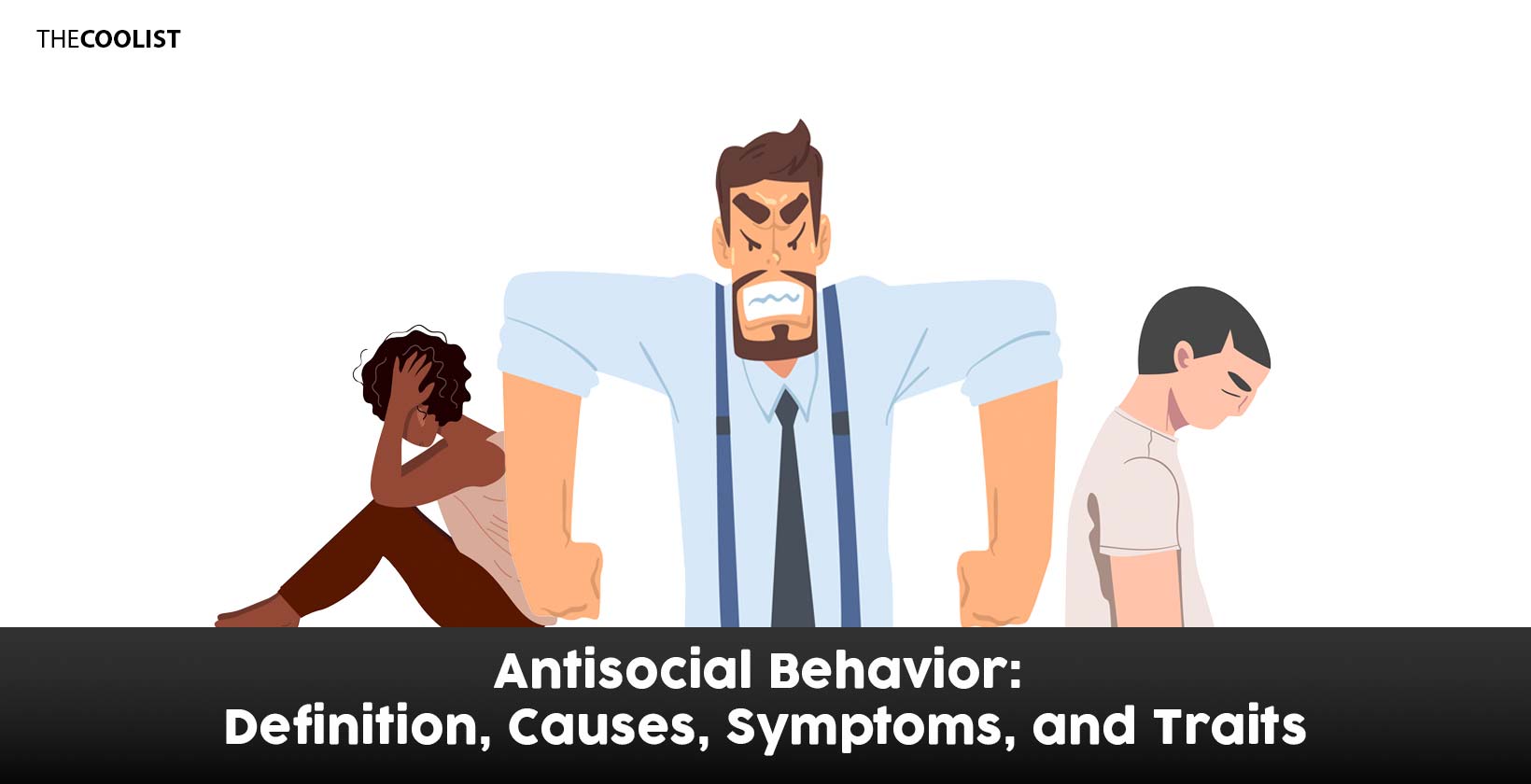View in gallery
Antisocial behavior is any behavior pattern that causes or is likely to cause hostility, nuisance, alarm, or disruption towards other people. Often, antisocial behaviors are characterized by voluntary and intentional aggression towards others.
Antisocial people are often described as impulsive, reckless, manipulative, deceitful, irresponsible, and violent. At their best, they may appear charming and witty, but antisocial people generally ignore the consequences of their actions, don’t care for rules, and even blame others for their problems. Antisocial personalities often act hasty and can be interpersonally irresponsible and vindictive with malicious tendencies and little to no regard for others’ feelings or rights.
Out of the sixteen personalities on the Myers-Briggs Type Indicator (“MBTI”), ISTJs and ESTPs are the least empathetic personality types, making them the most likely to develop antisocial behaviors. Some antisocial behaviors are also common to risk-taking ISTPs and rule-breaking INTJs.
What is antisocial behavior?
Antisocial behavior describes any act or behavioral patterns that are hostile or disruptive towards others. Antisocial behaviors may be overt, characterized by intentionally aggressive acts against parents, siblings, peers, and people in authority, or covert, characterized by aggressive behaviors against someone’s property.
Overt antisocial behaviors may include verbal abuse, bullying, or physical aggression. Meanwhile, covert antisocial behaviors may include lying, theft, vandalism, sneaking, and general non-compliance of social norms and rules. Covert or overt antisocial behavior can also manifest in reckless disregard for self and others. It can involve drug or alcohol abuse and high-risk activities.
Antisocial behavior can have serious and lasting impacts on your ability to function. Those with antisocial behavior patterns may develop maladjusted behaviors, especially when sustained over time. Some of its effects may include having fewer educational and work opportunities, and developing substance abuse and mental health issues.
Criminal behavior is a key symptom of antisocial behavior. An antisocial person has a higher risk of committing crimes and suffering incarceration at some point in their life.
Antisocial behaviors can also impact other people, the home, and the community as a whole. When left unchecked, this disruptive behavior pattern will persist and escalate over time and will become a chronic behavior disorder. The inability of someone with an antisocial disorder to consider other people’s feelings, thoughts, and motivations can lead to insensitivity and disregard for others. Antisocial people are more likely to have chaotic and unstable relationships, become unemployed, and experience homelessness.
What are the symptoms of antisocial behavior?
Fourteen symptoms of antisocial behavior are listed below.
- Reckless behavior or unnecessary risk-taking.
- Hostility, aggression, and violence towards others.
- Unable to control their anger.
- Frequent and significant irritability.
- Lack of empathy for other people.
- Complete disregard for rules and societal norms.
- Persistent lying, deceit, and manipulative behaviors.
- Using wit and charm to exploit others and for amusement or personal gain.
- Lack of conscience or remorse for hurtful actions.
- Abusive relationships.
- Recurring violations of the law.
- A pattern of irresponsible work behavior.
- Difficulty maintaining long-term relationships.
- Lack of guilt for their actions or the consequences thereof.
Antisocial behavior symptoms may be early onset, where patterns of disruptive behavior are identifiable in kids as young as four years old. Other antisocial behavior symptoms could manifest during mid to late adolescence and are not fully evident until the individual reaches adulthood.
What are the causes of antisocial behavior?
The exact cause of antisocial behavior is unknown, although several contributing factors increase the likelihood of a person inhibiting such behaviors. One key cause of antisocial behavior in some people is growing up in a dysfunctional family. Children in a chaotic and unstable home are likely to develop poor emotional regulation. Exposure to violence, childhood abuse, neglect, or mistreatment is an additional high-risk factor for having antisocial behavior later in life. Consequently, exposure to community violence is another cause for a person to act in antisocial ways.
Another familial risk factor for the development and persistence of antisocial behaviors includes a parental history of antisocial behavior or any other personality disorders. If one or both parents has a history of antisocial behavior, there’s a chance that the child will inherit or develop the same behaviors.
Genetics can also factor into behavioral development. Antisocial personality disorder (APD) is a serious mental illness defined by one’s severe lack of social awareness.
What are types of antisocial behavior?
Below are the three main types of antisocial behavior
- Personal antisocial behavior: A person may exhibit extreme hostility or aggression toward a specific person or group. Examples of personal antisocial behaviors include bullying, intimidation, harassment, racism, and sexism.
- Nuisance antisocial behavior: Actions that disrupt, annoy, or cause a community much trouble. Nuisance antisocial behavior includes things like making too much noise or playing loud music even after complaints, verbally or physically abusing the elderly, and careless driving.
- Environment antisocial behavior: When a person’s careless actions affect the environment, including public and private spaces. Examples of environmental antisocial behaviors include vandalism, graffiti, and littering.
What common traits do antisocial people have?
Below are the common traits that antisocial people have.
- Dishonest and manipulative: Antisocial people lack empathy and remorse and don’t worry about who they hurt or mistreated.
- Irritable and violent: They are antagonistic, always causing conflict with others, or show aggression toward people, animals, or properties.
- Impulsive and reckless: Antisocial people don’t plan ahead, fail to consider the consequences of their actions, and have a careless disregard for their own or others’ safety.
- Irresponsible: Antisocial people fail to respect the law and are often socially and financially irresponsible.
Which personality type is antisocial?
Below are the four personality types that are most likely to develop antisocial behavior.
- ISTJ: The ISTJ personality type is prone to anti-social behavior because their number one weakness is lacking empathy. ISTJs often come across as cold, emotionless, and rather stiff.
- ESTP: The ESTP personality’s propensity for antisocial behavior is characterized by their lack of empathy and little respect for others. You can trust ESTPs to get things done, but their single-minded focus, impatience, and bluntness are often at the cost of social repercussions.
- INTJ: People with an INTJ personality are prone to antisocial behavior because of their tendency to be dismissive of others’ opinions, pugnacity, and disregard for pointless rules. Another weakness of INTJs is their social ignorance, characterized by their lack of emotional intelligence.
- ISTP: The ISTP personality type shows antisocial tendencies in their rudeness and inconsiderate nature towards others’ emotions. ISTPs are also non-commital and have a high appetite for adventures and risks, which gets them in plenty of trouble.
Introvert-dominant personalities are likely to inhibit antisocial tendencies. However, it should be remembered that antisocial consists of other traits beyond introversion, such as hostility, antagonism, rudeness, aggression, and lack of empathy.
How can antisocial behavior be avoided?
Early intervention is key to avoiding antisocial behavior, especially in children. One effective way to prevent future antisocial behavior is to improve your social skills. Mastering even basic social skills can deter most of the risk factors of antisocial behaviors, such as aggression, hostility, and defiance towards authority. Building and improving your social skills can reaffirm social norms and teach conflict resolution, anger management, and emotional literacy.
It’s also important to identify the causes of antisocial behaviors to prevent escalation into future antisocial and criminal behavior. For one, troubling behaviors may simply be attributed to teen-hood, like mild rebellion, having an unstable home life, or a poor neighborhood environment. Addressing these risk factors can help minimize antisocial behaviors.
How does a person develop Antisocial Personality Disorder?
It’s unknown how exactly a person develops Antisocial Personality Disorder (APD), although research indicates links between APD and risk factors such as genetics, neurobiological, and environmental or societal stressors.
Research suggests that APD is likely strongly linked to genetics. Having first-degree biological relatives with antisocial tendencies makes a person likely to develop the same behaviors. Neurobiological risks like an abnormality in the prefrontal cortex structure of the brain put someone at higher risk of inheriting antisocial behaviors from their parents. The difference in the prefrontal cortex, which plays a role in planning, judgment, and impulse inhibition, can increase the risk of developing antisocial behavioral patterns.
Another instance that may increase a child’s likelihood of developing APD is heavy exposure to media violence. This risk factor desensitizes a person to violence, resulting in aggressive and antisocial behavior. In addition, influence from companions and peers also increases the risk of developing APD. Involvement with deviant peers who repeatedly reinforce rule-breaking can later result in common antisocial behaviors like substance abuse and delinquency.
How can a person with antisocial behavior socialize?
A person with antisocial behavior issues can start socializing in the following four ways.
- Identify the reasons for your antisocial behavior.
- Identify the reasons why you want to be more social.
- Find social engagements you are comfortable doing.
- Increase your social activities, learning the social ropes as you go.
But one key thing to understand when looking for ways for a person with antisocial behavior to be more social is that there is no single way to do it. That said, increasing your social activity does help with antisocial behaviors in the following ways:
- Teach you how to recognize social cues.
- Socialization reinforces acceptable behaviors.
If you want to boost your social skills and ability to connect with others, you can check out the guide on how to be more social: tips for increasing social activity.
Is antisocial behavior a learned behavior?
Yes, to a greater extent, antisocial behavior, like other behaviors, is shaped and learned via different associations, reinforcements, and imitations. A person’s upbringing, environment, and societal influences can result in antisocial behavior. However, it is also fair to say that certain heritable influences also play a significant role in developing antisocial behavior.
